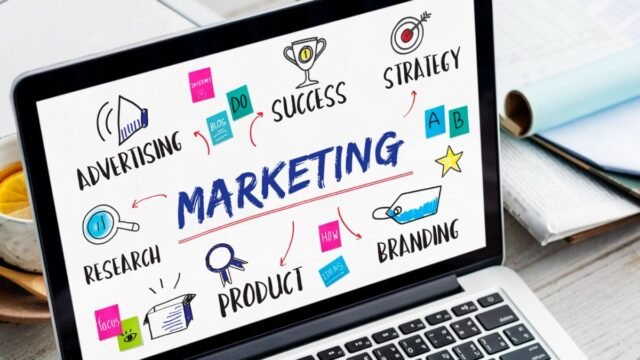Introduction to Digital Marketing
Ever wondered how those ads follow you around online or how your favorite brand always seems to pop up on your feed? That’s the magic of digital marketing. In today’s digital-first world, understanding how it works—and how it can help your business—is not optional; it’s essential.
What is Digital Marketing?
Digital marketing is the use of online platforms and technologies to promote products and services. Unlike traditional marketing (think TV ads and billboards), digital marketing meets people where they spend most of their time—online.
Channels Involved in Digital Marketing
- Social Media (Facebook, Instagram, LinkedIn)
- Search Engines (Google, Bing)
- Email Marketing
- Content Marketing (Blogs, Videos)
- Pay-Per-Click Ads (Google Ads, Meta Ads)
- Influencer & Affiliate Marketing
Why Digital Marketing Matters Today
Digital Age & Online Consumer Behavior
People are spending more time on their phones and computers than ever before. Whether they’re shopping, reading, or scrolling social media, digital spaces are the new battleground for businesses.
The Shift from Traditional to Digital
Traditional marketing still exists, but it’s no longer the king. Today, if your business isn’t online, it might as well be invisible. Customers want instant access, real-time responses, and personalized experiences.
10 Key Benefits of Digital Marketing
1. Cost-Effective Compared to Traditional Marketing
Running a TV or radio campaign? That’s pricey. But with digital marketing, you can start small—even with just a few dollars a day—and scale as you grow. This makes it ideal for startups and small businesses with limited budgets.
2. Measurable Results & Real-Time Analytics
One of the best things? You can track everything. From clicks and views to sales and conversions, digital marketing gives you insights to tweak and improve your campaigns instantly.
3. Global Reach with Local Targeting
Want to reach people in New York or just your neighborhood? You can do both. Digital tools allow for precise audience targeting—by age, gender, interests, location, and even behavior.
4. Increased Engagement with Audience
Unlike traditional methods, digital marketing is a two-way street. Comments, likes, shares, and DMs allow real-time interaction, building stronger relationships with customers.
5. Higher Conversion Rates
With the right call-to-action, landing pages, and email sequences, digital marketing can convert casual visitors into loyal buyers faster than traditional tactics.
6. Personalization & Better Customer Experience
Ever noticed how Netflix or Amazon recommends exactly what you like? That’s data-driven personalization. Digital marketing lets you tailor messages based on user behavior, creating a more relevant experience.
7. Builds Stronger Brand Reputation
By being active on social platforms, sharing valuable content, and engaging with users, businesses can build trust and become authorities in their niche.
8. Access to Mobile Consumers
More than 60% of online traffic now comes from mobile devices. Digital marketing is mobile-friendly, meaning your brand is in people’s hands—literally.
9. Easy to Adapt and Optimize
Something not working? Just tweak your strategy. You can test different ads, headlines, or emails and quickly pivot. That kind of flexibility is a game-changer.
10. Competitive Advantage
Most businesses are online, but not all are doing it right. A smart digital marketing strategy can help you stand out, outperform competitors, and grow faster.
Additional Advantages of Digital Marketing
Influencer & Affiliate Marketing Potential
Leverage someone else’s audience to boost your own. Influencer and affiliate marketing help you tap into trust and credibility without starting from scratch.
Multiple Content Formats
From blogs to reels, podcasts to webinars—you can communicate your message in countless ways depending on what your audience prefers.
Disadvantages of Digital Marketing
Intense Competition
Everyone’s online, and the space is crowded. To win attention, you need creativity, consistency, and strategy.
Time-Consuming Strategy
It’s not a “set it and forget it” game. Digital marketing requires time to plan, execute, test, and optimize regularly.
Privacy & Security Issues
With data comes responsibility. Businesses must protect user data and comply with regulations like GDPR, or they could face serious consequences.
Ad Blockers & Banner Blindness
Many users now install ad blockers or simply ignore banner ads. That means your content needs to be more value-driven than ever.
Dependence on Technology
A glitch, platform update, or algorithm change can suddenly affect performance. Relying too heavily on one channel can be risky.
Digital Marketing vs Traditional Marketing
Which is Right for Your Business?
If your audience is online, go digital. If you’re targeting older demographics or rural areas with limited internet, traditional might still hold value. Often, the best approach is a blend of both.
Blending Both Approaches
Smart brands mix traditional visibility with digital efficiency—like using print to drive people to a website or running radio ads alongside YouTube campaigns.
Final Thoughts
Digital marketing isn’t just a trend—it’s the future. It’s powerful, scalable, and allows you to connect directly with your audience in real time. Yes, it comes with challenges, but with the right mindset and strategy, the benefits far outweigh the downsides. Whether you’re a solo entrepreneur or a growing brand, tapping into digital marketing could be the smartest move you make this year.
FAQs
1. Is digital marketing suitable for small businesses?
Absolutely! Digital marketing is budget-friendly and scalable, making it perfect for small businesses looking to grow without breaking the bank.
2. How long does it take to see results from digital marketing?
It depends on the strategy. SEO may take months, while paid ads or email marketing can show results in days or weeks.
3. What are the most effective digital marketing channels?
It varies by business, but popular and effective channels include SEO, email marketing, content marketing, and social media advertising.
4. Can digital marketing work for local businesses?
Yes! With tools like Google My Business, local SEO, and geo-targeted ads, digital marketing is highly effective for local customer outreach.
5. How often should I update my digital marketing strategy?
At least every quarter. Markets, platforms, and consumer behavior change—your strategy should too.







